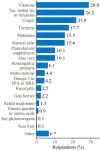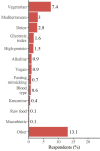Results of the ECHO (Eating habits CHanges in Oncologic patients) Survey: An Italian Cross-Sectional Multicentric Study to Explore Dietary Changes and Dietary Supplement Use, in Breast Cancer Survivors
- PMID: 34804915
- PMCID: PMC8596328
- DOI: 10.3389/fonc.2021.705927
Results of the ECHO (Eating habits CHanges in Oncologic patients) Survey: An Italian Cross-Sectional Multicentric Study to Explore Dietary Changes and Dietary Supplement Use, in Breast Cancer Survivors
Erratum in
-
Corrigendum: Results of the ECHO (Eating habits CHanges in Oncologic patients) Survey: An Italian Cross-Sectional Multicentric Study to Explore Dietary Changes and Dietary Supplement Use, in Breast Cancer Survivors.Front Oncol. 2022 Feb 2;12:851999. doi: 10.3389/fonc.2022.851999. eCollection 2022. Front Oncol. 2022. PMID: 35186773 Free PMC article.
Abstract
The role of a healthy diet in cancer prevention is well recognized. Recent data indicate that following the same advices can also improve cancer survivors' quality of life. Breast cancer (BC) patients are commonly concerned about diet and nutrition and frequently express the need to obtain health-related information and the will to change their diet and lifestyle. Hence, be aware of survivors' dietary changes and information needs is crucial for healthcare professionals to guide them toward optimal lifestyle choices. In order to investigate eating habits changes in a BC survivors' population, we conceived the cross-sectional multicentric study ECHO (Eating habits CHanges in Oncologic patients) Survey. Data were collected from 684 patients, diagnosed with invasive breast cancer, in order to investigate their changes in food consumption, use of supplements, or the beginning of a specific diet, after BC diagnosis. We also examined the sources of information used and if any modification in their diets was reported to the oncologist. We primarily observed that patients increased their consumption of vegetables, pulses, nuts, fruits, wholemeal bread/pasta, grains and fish; while decreasing red and processed meat, refined bread/pasta, baked good and animal fat consumption. Survivors also reported the use of dietary supplements, mainly vitamins, aimed at counteracting therapies' side effects. Changes in nutritional habits were often adopted without asking or informing the oncologist. Despite BC survivors made some positive changes in their nutritional habits, those modifications were mostly pursued by less than half of them, while the majority of patients consumed nutritional supplements after diagnosis. These results, as well as the failure to communicate with the physicians, reinforce the need to both improve the patient-healthcare professional relationship and to develop tailored nutrition counselling and intervention programs for cancer survivors.
Keywords: breast cancer; cancer patients; cancer survivors; dietary changes; eating habits survey; health information.
Copyright © 2021 Caprara, Tieri, Fabi, Guarneri, Falci, Dieci, Turazza, Ballardini, Bin, Cinieri, Vici, Montagna, Zamagni, Mazzi, Modena, Marchetti, Verzè, Ghelfi, Titta, Nicolis and Gori.
Conflict of interest statement
The authors declare that the research was conducted in the absence of any commercial or financial relationships that could be construed as a potential conflict of interest.
Figures



Similar articles
-
Results of the Italian cross-sectional web-based survey "Nutrition and breast cancer, what would you like to know?" An attempt to collect and respond to patients' information needs, through social media.Front Oncol. 2024 Sep 25;14:1436610. doi: 10.3389/fonc.2024.1436610. eCollection 2024. Front Oncol. 2024. PMID: 39386191 Free PMC article.
-
Corrigendum: Results of the ECHO (Eating habits CHanges in Oncologic patients) Survey: An Italian Cross-Sectional Multicentric Study to Explore Dietary Changes and Dietary Supplement Use, in Breast Cancer Survivors.Front Oncol. 2022 Feb 2;12:851999. doi: 10.3389/fonc.2022.851999. eCollection 2022. Front Oncol. 2022. PMID: 35186773 Free PMC article.
-
Do cancer patients change their diet in the e-health information era? A review of the literature and a survey as a proposal for the Italian population.Food Res Int. 2018 Feb;104:59-68. doi: 10.1016/j.foodres.2017.10.021. Epub 2017 Oct 16. Food Res Int. 2018. PMID: 29433784 Review.
-
Self-Reported Changes and Perceived Barriers to Healthy Eating and Physical Activity among Global Breast Cancer Survivors: Results from an Exploratory Online Novel Survey.J Acad Nutr Diet. 2021 Feb;121(2):233-241.e8. doi: 10.1016/j.jand.2020.09.031. Epub 2020 Oct 24. J Acad Nutr Diet. 2021. PMID: 33109503 Free PMC article.
-
Nutrition and primary prevention of breast cancer: foods, nutrients and breast cancer risk.Eur J Obstet Gynecol Reprod Biol. 2005 Dec 1;123(2):139-49. doi: 10.1016/j.ejogrb.2005.05.011. Eur J Obstet Gynecol Reprod Biol. 2005. PMID: 16316809 Review.
Cited by
-
Results of the Italian cross-sectional web-based survey "Nutrition and breast cancer, what would you like to know?" An attempt to collect and respond to patients' information needs, through social media.Front Oncol. 2024 Sep 25;14:1436610. doi: 10.3389/fonc.2024.1436610. eCollection 2024. Front Oncol. 2024. PMID: 39386191 Free PMC article.
-
Phytonutrients and outcomes following breast cancer: a systematic review and meta-analysis of observational studies.JNCI Cancer Spectr. 2024 Jan 4;8(1):pkad104. doi: 10.1093/jncics/pkad104. JNCI Cancer Spectr. 2024. PMID: 38070485 Free PMC article.
-
An Integrated Care Approach to Improve Well-Being in Breast Cancer Patients.Curr Oncol Rep. 2024 Apr;26(4):346-358. doi: 10.1007/s11912-024-01500-1. Epub 2024 Feb 24. Curr Oncol Rep. 2024. PMID: 38400984 Free PMC article. Review.
-
The effect of resveratrol, curcumin and quercetin combination on immuno-suppression of tumor microenvironment for breast tumor-bearing mice.Sci Rep. 2023 Aug 16;13(1):13278. doi: 10.1038/s41598-023-39279-z. Sci Rep. 2023. PMID: 37587146 Free PMC article.
-
The healthy eating index may not be an appropriate indicator for assessing dietary quality in breast cancer survivors: results from NHANES 2005-2018.Front Nutr. 2024 Dec 30;11:1519607. doi: 10.3389/fnut.2024.1519607. eCollection 2024. Front Nutr. 2024. PMID: 39807218 Free PMC article.
References
-
- NCI Dictionary of Cancer Terms. Bethesda (MD). Available at: https://www.cancer.gov/publications/dictionaries/cancer-terms/def/survivor https://www.cancer.gov/publications/dictionaries/cancer-terms/def/survivor (Accessed 02 Jan 2021).
-
- Division of Cancer Control and Population SciencesNational Cancer Institute National Institutes of Health . Office of Cancer Survivorship—Definitions. Available at: https://cancercontrol.cancer.gov/ocs/statistics/definitions.html http://cancercontrol.cancer.gov/ocs/statistics/definitions.html.
-
- J F, Ervik J, Lam F, Colombet M, Mery L, Piñeros M, et al. . Global Cancer Observatory: Cancer Today. Lyon, France: International Agency for Research on Cancer; (2020). Available at: https://gco.iarc.fr/today (Accessed 02 Jan 2021).
-
- Gori S, Alavilla G, Ascierto P, Bracarda S, Sileni Vanna C, Comandone A, et al. . I Numeri Del Cancro in Italia 2020. In: Intermedia Editore. AIOM-AIRTUM. Brescia: Intermedia Editore; (2020). Available at: https://www.aiom.it/i-numeri-del-cancro-in-italia/.
-
- World Cancer Research Fund/American Institute for Cancer . Diet, Nutrition, Physical Activity and Cancer: A Global Perspective. Continuous Update Project Expert Report 2018. London: The World Cancer Research Fund; American Institute for Cancer Research; (2018).
LinkOut - more resources
Full Text Sources

